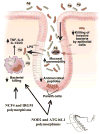Commensal bacteria, traditional and opportunistic pathogens, dysbiosis and bacterial killing in inflammatory bowel diseases
- PMID: 19352175
- PMCID: PMC2763597
- DOI: 10.1097/QCO.0b013e32832a8a5d
Commensal bacteria, traditional and opportunistic pathogens, dysbiosis and bacterial killing in inflammatory bowel diseases
Abstract
Purpose of review: The authors present evidence published during the past 2 years of the roles of commensal and pathogenic bacteria in the pathogenesis of the inflammatory bowel diseases.
Recent findings: Rodent models conclusively implicate commensal enteric bacteria in chronic, immune-mediated, experimental colitis, and genetically determined defects in bacterial killing by innate immune cells are found in a subset of patients with Crohn's disease. There is no evidence that a single pathogen, including Mycobacterium avium subspecies paratuberculosis, causes Crohn's disease or ulcerative colitis. However, adherent/invasive Escherichia coli are associated with ileal Crohn's disease, with the mechanisms and genetics of adherent/invasive E. coli virulence being elucidated. Molecular characterization of the microbiota in patients with inflammatory bowel diseases reveals decreased biodiversity of commensal bacteria, most notably the phyla Bacteroidetes and Firmicutes, including the clinically relevant Faecalibacterium prausnitzii, and increased E. coli concentrations. VSL#3 is one probiotic preparation shown to be efficacious in certain clinical situations in small clinical trials.
Summary: Further characterization of altered microbiota in patients with inflammatory bowel diseases and linking dysbiosis with host genetic alterations in immunoregulation, innate microbial killing and barrier function are critical, so that individualized treatments to increase beneficial commensals and their metabolic products (probiotic and prebiotic administration) and diminish deleterious species such as adherent/invasive E. coli can be tailored for defined patient subsets.
Figures

References
-
- Kappelman M, Rifas-Shiman SL, Porter CQ, et al. Direct health care costs of Crohn’s disease and ulcerative colitis in US children and adults. Gastroenterology. 2008;135(6):1907–1913. This study estimates the direct costs of CD and UC in over 19,000 patients in the United States, describing the distribution of costs and identifying sociodemographic factors that influence these costs. - PMC - PubMed
-
- Sartor RB. Microbial influences in inflammatory bowel diseases. Gastroenterology. 2008;134:577–594. This comprehensive review outlines the roles of commensal bacterial species, host genetic polymorphisms, and hyperactive immune responses in the pathogenesis of IBD. - PubMed
Publication types
MeSH terms
Grants and funding
LinkOut - more resources
Full Text Sources
Other Literature Sources
Research Materials
Miscellaneous

